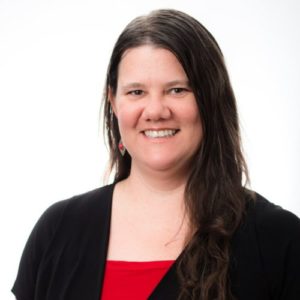In this interview, Shannon McDonald talks about her experiences and motivations as a ReUp Success Coach and the importance of making students feel seen, heard, and supported.
How do you apply your own experiences and challenges with college to support your students?
I use a lot of my past and personal experience to support students. I’m a first-generation college graduate. I hold two degrees; I obtained my MA while also delivering a baby without taking time off, so having a traditional and nontraditional success story helps with perspective.
Also, my father is a true educational inspiration that I draw on for adult learners who are 50+. My dad got his RN at 58 and later his BSN. He worked full-time on weekends and lived apart from my mom most of the week while attending classes in person on a traditional class schedule 2.5 hours away from his house. It took five years, and he was valedictorian of his class. He instilled a belief that lifelong learning was not only possible but essential in this professional world and economy. He’s my example when coaching on age awareness and issues older folks may be struggling with when they first decide to look into going back.
What do you love most about being a coach?
I love that I can encourage individuals to embrace their goals and dreams and illuminate the skills, knowledge, and abilities they’ll need to reach them. I really believe that people can achieve their dreams, no matter how far removed they may be or seem to be in college.
What is special about the way ReUp works with students?
First, we assume you are a whole and capable person from start to finish. We seek only to shine a light on the unknown so a person may make the best decision for themselves, their families, and their futures.
Secondly, we work with folks as long as it takes, whereas in my coaching past, that was not possible due to the organization’s business model. When the end goal is a diploma and life is a constant, the long-term connection makes real change visible and holistic.
What differences has it made in students’ lives?
For some, it’s just a check-in now and again to feel connected to the goal of returning or finishing, whereas for others, I know so much about their personal lives, families, etc.—it’s true connectivity. ReUp coaching says, “I believe in you,” and that’s new for a lot of folks who have had to press pause on education for many very understandable and unpreventable reasons.
In your work with students, what do you think are some of the biggest misconceptions universities have about students who have taken a break from school?
Ten to twelve years ago, the term stopout didn’t exist in common vernacular. Dropout was the go-to for anyone who started a degree but didn’t finish it. The landscape is changing to allow for more compassionate language, but some of the more traditional reasons for leaving are still deeply believed by college administrators. For instance, many still believe if you have a low GPA, you must not be a “good student” and perhaps do not deserve accommodations to continue.
“Breaking the misconception that it’s an individual’s lack of determination or commitment by highlighting the core reasons that lead to a student dropping out, I believe, will help show how universities might change policies and procedures to make college more accessible to everyone.”
Academic success is not always just discipline, intelligence, or academic rigor. More often than not, major life events impact a person’s ability to focus on their studies and may lead to a low GPA. Breaking the misconception that it’s an individual’s lack of determination or commitment by highlighting the core reasons that lead to a student dropping out, I believe, will help show how universities might change policies and procedures to make college more accessible to everyone. Such actions include flexibility for adult learners and class schedules that allow for workers to balance the professional, educational, and personal aspects of their lives. For college to be accessible to all learners, stopouts, or adults overall, it’s important to see through the surface reasons students drop out and find the core challenges in order to effect real change at an institution.
Why is ReUp important for the education industry overall?
ReUp holds space for adults to explore how to reintegrate school into their lives and why they want to in the first place. Coaching can inform their understanding of themselves and their educational goals to create active learners who are more in control of their trajectories and can build working relationships with faculty and staff for collaborative ownership. We also share feedback and trends with partners to help pinpoint pain points universities might be able to remove for a more seamless return.



